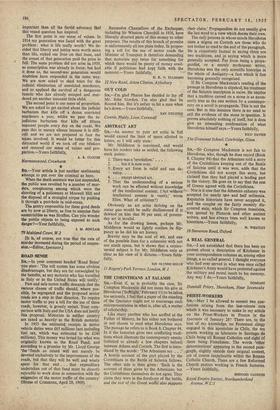ROAD SENSE Snt,—In your comment headed 'Road Sense' you state:
'The toll system has some obvious disadvantages, but they are far outwcighcd by the benefits, as any motorist who has travelled in Italy or in the United States will testify.' Fast and safe motor traffic demands that the various classes of traffic should, where pos- sible, be segregated and the proposed motor roads are a step in that direction. To require motor traffic to pay a toll for the use of these roads, however, is grossly unjust. Your com- parison with Italy and the USA does not justify this proposal. Motorists in neither country are taxed as heavily as the British motorist.
In 1953 the estimated receipts in motor vehicle duties were £65 millions (not including fuel tax, which was estimated to be £240 millions). This money was levied for what was originally known as the Road Fund, and according to a promise by Mr. Lloyd George 'the funds so raised will not merely be devoted exclusively to the improvement of the roads, but that they will be well and wisely spent for that end . . . that expenditure undertaken out of that fund must be directly referable to work done in connection with the exigencies of the motor traffic of the country' (House of Commons, April 29, 1909). Successive Chancellors of the Exchequer, including Sir Winston Churchill in 1926, have liberally diverted parts of this money to other purposes. The results of this breach of promise is unfortunately all too plain today. In propos- ing a toll for the use of motor roads the Minister of Transport is therefore demanding that motorists pay twice for something for which there would be plenty of money avail- able if politicians had kept faith with the motorist.—Yours faithfully, D. K. 0. ULLMANN 12 New Road, Aston Clinton, Aylesbury










































 Previous page
Previous page